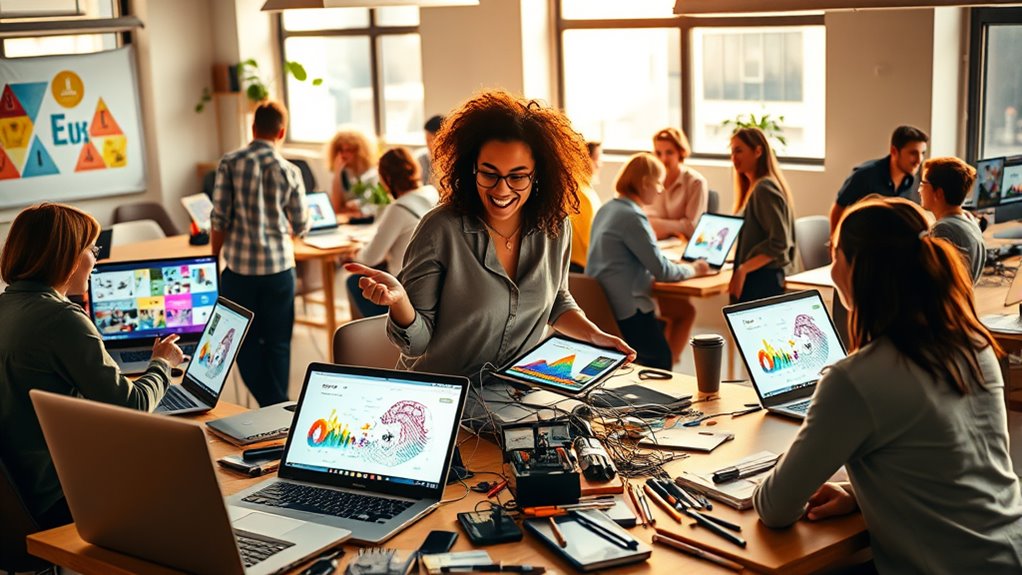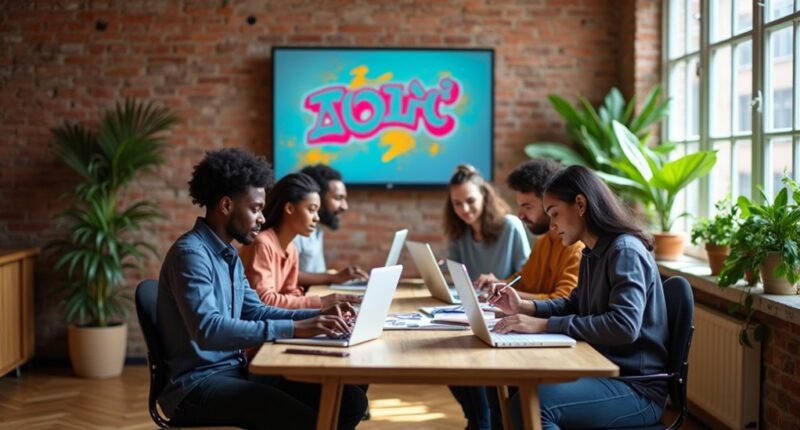AI is revolutionizing how Millennials work by automating routine and repetitive tasks, freeing you to focus on innovation and originality. With AI tools, you can generate fresh ideas quickly, streamline workflows, and enhance creative quality, reducing digital fatigue and mental overload. It acts as a collaborative partner, helping you stay inspired and tackle creative blocks more easily. Staying engaged with these technologies can unseal new levels of creativity—discover how to make the most of this evolving landscape.
Key Takeaways
- AI automates routine tasks, freeing Millennials to focus on innovative and creative projects.
- Generative AI offers diverse ideas and visual options, enhancing creative exploration and originality.
- AI accelerates content production, reducing time spent on repetition and enabling rapid experimentation.
- Many Millennials receive insufficient training but see AI as a collaborative partner boosting creativity.
- Automation reduces digital fatigue and stress, allowing Millennials to dedicate energy to problem-solving and innovation.

Artificial intelligence is transforming how Millennials approach their work and creativity by automating repetitive tasks and providing instant access to innovative ideas. As a digital-native generation, you’re already quick to adopt new technologies, with about 65% of AI users belonging to Millennials or Gen Z. Many of you believe AI will make you more efficient, especially in work and creative pursuits, with 85% expecting AI to boost your productivity. This mindset is reflected in your everyday use of AI tools at work, where you simplify tasks—particularly repetitive ones—so you can dedicate more time to strategic thinking and originality.
In marketing and content creation, Millennials are leading the charge, engaging heavily with generative AI for inspiration and production. Over 70% use AI to craft copy or spark creative ideas, which accelerates your workflow and enhances your output. Despite this high engagement, nearly 40% report lacking sufficient training to harness AI’s full potential safely and effectively. Still, you recognize AI as a powerful partner that amplifies your creativity rather than replaces it. High refresh rates in gaming projectors, for example, can further enhance creative presentations by making visuals appear smoother and more engaging.
AI’s influence on your creative process is significant. Access to AI-generated ideas can enhance your creativity by around 8-9%, especially in storytelling, design, or branding. It acts as a catalyst for innovation, giving you a broader palette of ideas to work from, and reducing the time spent on mundane tasks. AI tools can generate large volumes of images rapidly, with millions created daily, allowing you to explore visual concepts at a scale impossible manually. This rapid prototyping accelerates campaign development, enabling you to test ideas quickly and iterate faster.
Using AI as an assistant helps you overcome creative blocks by providing diverse perspectives and options. This support boosts both the quality and enjoyment of your work, making your creative output more original and engaging. *Furthermore*, AI’s ability to handle repetitive tasks lessens digital fatigue, helping you manage stress and avoid burnout. Automation of routine processes reduces mental overload and frees up your mental energy for higher-level creative and strategic activities. This widespread adoption is also supported by the fact that Millennials are among the most active users of AI-driven creative tools, actively shaping the future of digital content creation.
As a Millennial, you’re also aware that your acceptance of AI correlates with improved creative performance, especially if you have relevant education or experience. Younger creators tend to be more open to integrating AI into their workflows, which fosters continuous innovation. By streamlining repetitive work, AI allows you to focus on problem-solving and pushing boundaries, ultimately transforming your creative process into a more fulfilling and balanced experience. This shift not only enhances your productivity but also helps you reclaim time and mental space for truly innovative pursuits.
Frequently Asked Questions
How Does AI Influence Millennial Career Choices?
AI influences your career choices by automating routine tasks, freeing you to focus on creativity and strategic thinking. It encourages you to develop new skills like AI literacy and problem-solving, making you more adaptable in a changing job market. With AI driving innovation, you’re motivated to pursue roles that blend technology with human skills, offering higher pay, security, and the chance to explore more meaningful, flexible, and creative work opportunities.
What Skills Should Millennials Develop Alongside AI Tools?
You should develop strong soft skills like communication, empathy, leadership, and emotional intelligence, as they complement your technical AI skills. Focus on critical thinking, adaptability, and creativity to solve complex problems and innovate effectively. Staying informed about AI ethics and governance guarantees responsible use. Embrace lifelong learning through hands-on projects, peer collaboration, and continuous curiosity to stay ahead and maximize AI’s potential in your career.
Can AI Replace Human Creativity Completely?
AI can’t fully replace human creativity because it lacks genuine emotion, consciousness, and the ability to generate truly original ideas. You bring personal experiences, cultural insights, and intuitive judgment that AI can’t replicate. While AI can assist by automating tasks or inspiring new concepts, your unique motivation, purpose, and emotional depth are irreplaceable. You remain the essential driver of authentic, meaningful creative expression.
How Accessible Are AI Tools for Young Creators?
AI tools feel like a gateway, opening doors to endless possibilities for you. They’re highly accessible, especially through platforms like Canva and Replit, which offer free tiers and user-friendly interfaces. Most young creators have easy access, with only a small percentage facing restrictions or lack of resources. Mobile and browser-based options make AI tools even more reachable, empowering you to create without barriers, regardless of location or technical skill.
What Ethical Considerations Surround AI in Creative Fields?
You should consider the ethical challenges AI brings to creative fields. It’s crucial to guarantee AI respects copyright laws, avoids bias, and maintains transparency about generated content. You need to prioritize human oversight to prevent unfair stereotypes and cultural insensitivity, and protect privacy rights. Being aware of these issues helps you use AI responsibly, ensuring your creative work is ethical, fair, and respectful of original creators and cultural contexts.
Conclusion
As you embrace AI’s capabilities, you might find it funny how technology, once seen as a threat, now lets you chase your creative passions more freely. It’s almost like the universe conspired to give you tools that free you from repetitive tasks, so you can focus on what truly inspires you. So, as you explore this new frontier, remember—you might just stumble upon your next big idea when you least expect it, thanks to AI.









